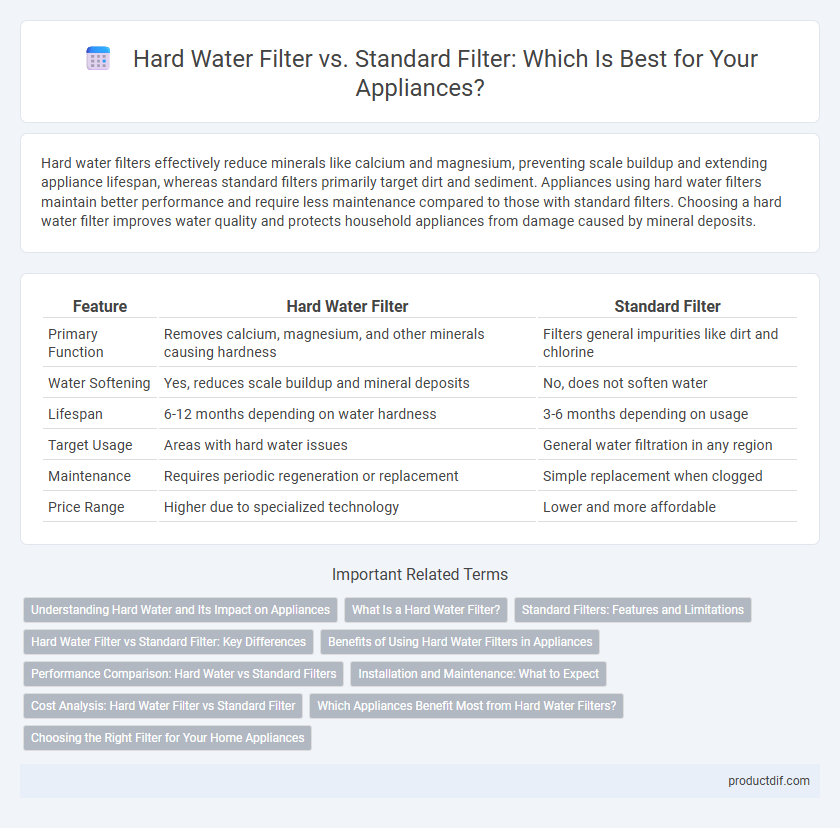Hard water filters effectively reduce minerals like calcium and magnesium, preventing scale buildup and extending appliance lifespan, whereas standard filters primarily target dirt and sediment. Appliances using hard water filters maintain better performance and require less maintenance compared to those with standard filters. Choosing a hard water filter improves water quality and protects household appliances from damage caused by mineral deposits.
Table of Comparison
| Feature | Hard Water Filter | Standard Filter |
|---|---|---|
| Primary Function | Removes calcium, magnesium, and other minerals causing hardness | Filters general impurities like dirt and chlorine |
| Water Softening | Yes, reduces scale buildup and mineral deposits | No, does not soften water |
| Lifespan | 6-12 months depending on water hardness | 3-6 months depending on usage |
| Target Usage | Areas with hard water issues | General water filtration in any region |
| Maintenance | Requires periodic regeneration or replacement | Simple replacement when clogged |
| Price Range | Higher due to specialized technology | Lower and more affordable |
Understanding Hard Water and Its Impact on Appliances
Hard water contains high levels of minerals like calcium and magnesium, which cause scale buildup and reduce appliance efficiency. Hard water filters use ion exchange or reverse osmosis to remove these minerals, protecting appliances from damage and extending their lifespan. Standard filters typically focus on removing sediment and chlorine but do not address the mineral content that leads to hard water scaling.
What Is a Hard Water Filter?
A hard water filter is specifically designed to remove minerals like calcium and magnesium that cause water hardness, preventing scale buildup in appliances. Unlike standard filters that mainly target chlorine and sediment, hard water filters use ion exchange or reverse osmosis technology to soften water effectively. Installing a hard water filter extends appliance lifespan and improves water quality for daily household use.
Standard Filters: Features and Limitations
Standard water filters typically use activated carbon or sediment filtration to remove common contaminants like chlorine, dirt, and rust, improving water taste and odor. These filters often have limited capacity for reducing hardness minerals such as calcium and magnesium, which contribute to scale buildup in appliances. While cost-effective and easy to install, standard filters require frequent replacement and are less effective in managing hard water challenges compared to specialized hard water filters.
Hard Water Filter vs Standard Filter: Key Differences
Hard water filters use ion exchange resins or reverse osmosis to remove calcium and magnesium ions, preventing scale buildup in appliances. Standard filters typically focus on sediment and chlorine removal without addressing mineral hardness. The key difference lies in hard water filters' ability to improve appliance longevity by reducing mineral deposits, whereas standard filters primarily enhance water taste and clarity.
Benefits of Using Hard Water Filters in Appliances
Hard water filters significantly reduce mineral buildup from calcium and magnesium in appliances, extending their lifespan and enhancing efficiency. These filters prevent scale accumulation that can impair heating elements and reduce water flow, leading to lower energy consumption and maintenance costs. Using hard water filters improves appliance performance and ensures cleaner, softer water output for better cleaning and rinsing results.
Performance Comparison: Hard Water vs Standard Filters
Hard water filters are engineered with specialized resin beads or ion-exchange systems to effectively remove calcium and magnesium ions, significantly reducing limescale buildup compared to standard filters. Standard filters primarily focus on trapping sediment and chlorine, offering limited protection against mineral hardness, which can impair appliance performance and lifespan. By improving water softness, hard water filters enhance appliance efficiency, prevent clogs, and extend maintenance intervals relative to standard filtration systems.
Installation and Maintenance: What to Expect
Hard water filters typically require professional installation due to their complex systems designed to remove minerals like calcium and magnesium, whereas standard filters are often simpler and can be installed by homeowners. Maintenance for hard water filters involves regular salt refills and periodic system checks to prevent scale buildup, while standard filters usually need only routine cartridge replacements every few months. Understanding these differences helps ensure optimal appliance performance and longevity in varying water conditions.
Cost Analysis: Hard Water Filter vs Standard Filter
Hard water filters typically have a higher initial cost compared to standard filters due to advanced filtration media like ion exchange resins or reverse osmosis components. Operating expenses for hard water filters can be lower over time as they reduce scale buildup and prolong appliance lifespan, whereas standard filters may require more frequent replacements and maintenance. Evaluating total cost of ownership reveals that investing in hard water filters can lead to significant savings by preventing appliance damage and reducing energy consumption.
Which Appliances Benefit Most from Hard Water Filters?
Appliances such as dishwashers, washing machines, and coffee makers benefit most from hard water filters because they reduce mineral buildup that causes scaling and damage. Hard water filters enhance appliance longevity and improve performance by preventing limescale deposits in water heaters and plumbing components. This filtration is especially critical in areas with high water hardness, ensuring consistent efficiency and lower maintenance costs.
Choosing the Right Filter for Your Home Appliances
Hard water filters are specifically designed to remove calcium, magnesium, and other minerals that cause scale buildup in appliances, extending their lifespan and improving efficiency. Standard filters primarily target sediment and chlorine but do not address the mineral content of hard water, which can lead to frequent maintenance and reduced appliance performance. Selecting a filter compatible with your appliance's water hardness level ensures optimal protection and enhances overall functionality.
Hard Water Filter vs Standard Filter Infographic

 productdif.com
productdif.com